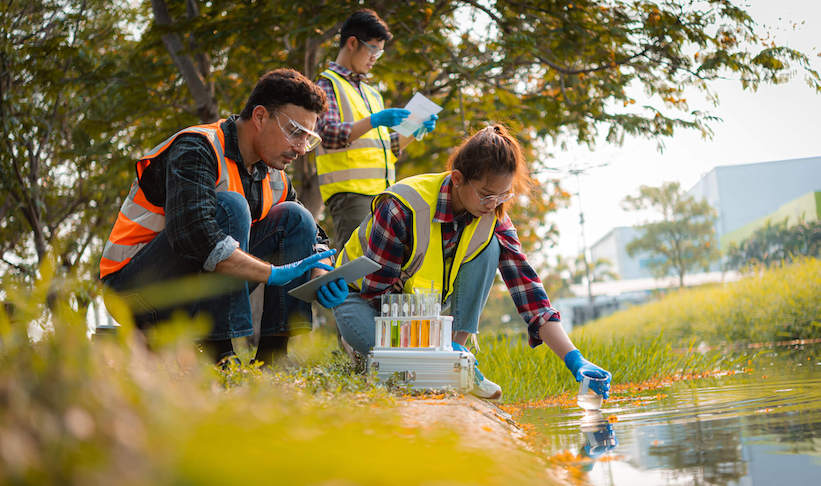If you’re interested in making a difference in the field of public health then obtaining a master’s degree can be helpful in developing the experience, knowledge and skills that will aid in your success. While the Master of Public Health (MPH) and Master of Science in Public Health (MSPH) degrees both play important roles in preparing students for the responsibility and challenge of improving public health, they do differ in a few key ways.
The biggest difference between the MSPH and MPH is in research specialization. The specific focus of each degree is more suited towards different skill sets and career paths, so one or the other will be preferable depending on your background and future career goals.
Read on for a breakdown of which degree may be right for you and your goals, as well as a consideration of other areas of study where you can make a difference in public health.
What is a Master of Public Health (MPH)?
The Master of Public Health is a graduate degree for those who want to take an active community role regarding awareness and education of health matters relating to disease, addiction, disaster recovery, water/waste management and similar concerns. Areas of study will include Epidemiology, Public Health Administration & Policy, Biostatistics, Environmental Health and Behavioral/Social Science.
MPH programs are considered to be “applied” professional degree programs designed to promote “hands-on” learning, where students develop and refine skills to design public health studies; collect, analyze and interpret data; and interpret and report the results of studies. Most programs expect students to complete internships or projects within their field of study as part of the curriculum.
What is a Master of Science in Public Health (MSPH)?
The Master of Science in Public Health graduate degree is a more traditional academic degree program with a curriculum that is heavily research-focused. It is designed to prepare students for careers as educators and researchers through a focus on research design, data collection and analysis studies.
MSPH degrees cover the same areas of study as MPH degrees but may also include courses on Research Methods and/or Health Informatics. Graduates of these programs are expected to be able to use research and experimental and statistical methods to analyze and solve public health issues through leadership, consultation and the application of ethical principles of public health.
MPH vs. MSPH
As master’s degree programs that study public health, the differences between MSPH and MPH programs are few:
- Both will take around two years to complete, depending upon the requirements of the specific program and whether they’re offered part-time or full time.
- Both programs cover the same areas of study, with electives related to epidemiology, public health policy, biostatistics, environmental health and behavioral/social science.
- Both will require candidates to possess a bachelor’s degree in a related field and, though neither program will require prior work experience, some MPH programs may prefer candidates who have worked in the field of public health.
The biggest difference is that the MPH is considered a “terminal” or “professional” degree, which means that upon graduation, the student ends their academic career and begins their professional work. Graduates of an MSPH program, in comparison, may elect to continue studying to earn a doctorate of public health, known as a DrPH. This distinction is reflected in the final requirements of both master’s programs, where MPH students are required to work on a field-based research or capstone project, while MSPH students are expected to write and defend a thesis.
In terms of cost, there’s no real difference between either type of program, as tuition costs are more determined by the prestige of the program, where the school is located and whether the student is considered in state or out of state.
| MPH | MSPH | |
| Time to Complete | Two Years (on average) | Two Years (on average) |
| Topics of Study | Epidemiology, Public Health Administration & Policy, Biostatistics, Environmental Health and Behavioral/Social Science | Epidemiology, Public Health Administration & Policy, Biostatistics, Environmental Health and Behavioral/Social Science, Research Methods, Health Informatics |
| Educational Requirements | Bachelor’s Degree | Bachelor’s Degree |
| Prior Work Experience | Preferred | Not Needed |
| Final Degree Requirement | Field-based Research or a Capstone Project | Writing and Defending a Thesis |
| Common Career Paths | Industry, Government, NPOs | Industry, Education, Government, Consultation, Research |
MPH vs. MSPH: Career Options
Graduates of MPH programs are a great fit for positions in healthcare industries, public policy committees, nonprofit organizations, government agencies, administration and community practice settings. They’re able to contribute to and interpret public health studies and advocate for policy changes for the betterment of public health. Common career employment options for MPH graduates include:
- Community and Social Service Manager — Responsible for coordinating and supervising programs and organizations that promote public health causes and initiatives. Salary range of $64,400 to $85,800. According to the U.S. Bureau of Labor Statistics (BLS), there’s an expected above-average job growth of 15% from 2020 to 2030.
- Emergency Management Coordinator — Expected to create plans and procedures for disaster response and then help to lead the response to natural disasters and other emergencies through the coordination of resources and funds. Salary range of $54,094 to $68,694.
- Water Quality Manager — Supervises, directs and organizes water quality for a region, ensuring that all activity complies with appropriate regulations and oversees proper land use and watershed management. Salary range of $74,818 to $89,703.
The MSPH degree equips graduates with the tools to advocate for positive public health policy change. MSPH professionals operate on a more academic level, performing research to establish a big picture of issues relating to public health. Career employment options include:
- Biostatistician — Responsible for collecting and analyzing public health data to measure factors that impact health and wellness, including the design of studies that test the efficacy of drug treatments and the source of disease outbreaks. Salary range of $74,634 to $95,768. According to the BLS, there’s an expected above-average job growth of 33% from 2020 to 2030.
- Environmental Scientist — Gathers and analyzes data related to environmental conditions in order to assess risks, measure impacts to the environment and the population and then develop plans to address matters like pollution or development. Salary range of $60,722 to $78,448.
- Health Educator — Teaches individuals and communities how to live healthier lifestyles, performs health training needs assessment and designs health education programs and curricula. Can also work as a professor in colleges and universities. Salary range of $58,581 to $71,355.
It’s important to note that these are only general career tendencies and are not necessarily mutually exclusive. There are numerous career options available for either MPH or MSPH graduates, including:
- Epidemiologists — Responsible for investigating patterns and causes of disease and injury to reduce the risk and occurrence of negative health outcomes for communities. Salary range of $82,142 to $120,324. According to BLS, there’s an expected above-average job growth of 30% from 2020 to 2030.
- Public Health Informatics Specialist — Develops, designs and manages informatics in areas of public health related to outbreak management, bio-surveillance, disease prevention and other public health matters. Salary range of $81,390 to $104,990.
- Public Health Officer — Coordinates healthcare institutes and organizations to ensure that healthcare systems are following proper health codes and safety measures. Salary range of $52,000 to $73,042.
These examples are only a handful of possible career paths for graduates of either program. Those interested in working in public health may also choose careers as lecturers, nutrition consultants, infectious disease consultants and healthcare analysts.
Salary ranges are sourced from salary.com as of December 2021
| Job Title | Salary Range | Related Degree |
| Community and Social Service Manager | $64,400 to $85,800 | MPH |
| Emergency Management Coordinator | $54,094 to $68,694 | MPH |
| Water Quality Manager | $74,818 to $89,703 | MPH |
| Biostatistician | $74,634 to $95,768 | MSPH |
| Environmental Scientist | $60,722 to $78,448 | MSPH |
| Health Educator | $58,581 to $71,355. | MSPH |
| Epidemiologists | $82,142 to $120,324 | MPH or MSPH |
| Public Health Informatics Specialist | $81,390 to $104,990 | MPH or MSPH |
| Public Health Officer | $52,000 to $73,042 | MPH or MSPH |
Which is Right for My Career?
When it comes to the question of which is better, MSPH or MPH, the answer ultimately depends on your interests and long-term goals. While the MPH is more of a professional practitioner degree for those who want to work on specific public health issues, the MSPH is more for those with academic interests who would like to focus on the “big picture” of public health.
However, either program is suitable for students looking to work in many medical, educational, non-profit, technology, research and government settings. If you’re thinking about a direction to take, then it’s recommended to take a moment to ask some questions of yourself before researching possible options.
- Consider your personal “why” — what is it that calls you to these options?
- What are your personal values? What moves you to take action?
- What positive change do you want to bring to the world?
- Are you looking to make a local impact, or are you more considerate of big-picture goals like working towards better sustainability?
If you’re a health professional who understands that the built environment (eg., transport, energy systems, water and sanitation) directly affects the health of a population, and want to make a difference with positive public health solutions, then we invite you to consider the University of San Diego’s Master of Science for Engineering and Sustainability and Health.
This unique program takes a different approach to public health issues by immersing students within a transdisciplinary approach to community work, social justice, sustainability, global health and international development through the blending and application of knowledge from a diversity of schools and disciplines. Read more about the MESH program of study and how you can be a part of creating a better future for public health.




